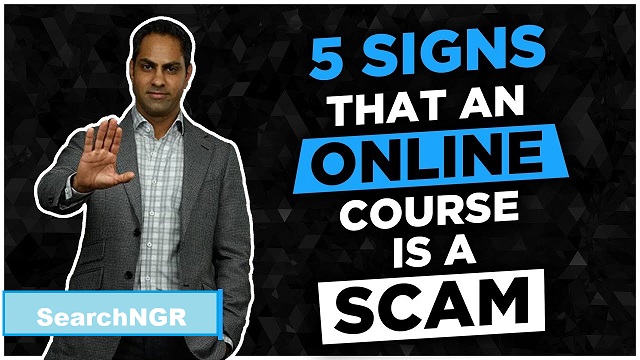Opportunities
5 things to check if an online course is a scam

Online learning has become a thing now. With the internet permeating every aspect of human life, it was about time that it entered the education and learning sector. Its popularity is because of the comfort and freedom that it offers as well as the affordability.
However, this comfort has come with a price. The risk of getting scammed has increased because of the rising numbers of online courses pouring in every day. Here is how you can save yourself from falling into a scammer’s trap:
Read the Testimonials Carefully
Testimonials are proof that people are learning something from the course and find it satisfactory. They are the feedback from people who took up this course. So, read carefully and see if the feedback sounds natural and true. Does it discuss the instructor and the course syllabus/resources? If yes, it might not be genuine. Even if such testimonials are actually written by a real customer, they are not something you should heed.
A good, reliable testimonial talks about the results of the course. It tells us how it helped the customers in their career path or if it served its purpose. If the course is entertaining (as per the testimonials), that is just the side benefit. It is not the main purpose of the course and thus should not be considered so while assessing the course’s value and authenticity. So, the testimonials should include some real-world experiences. Otherwise, it is better to avoid purchasing this course.
Responses to Queries
Even if it is an online course, it is still a product and needs to be dealt with professionally. See if the course’s owner is forthcoming and addresses the queries raised by you as a potential buyer. If so, the course can be a legit deal. Assess the owner’s behavior when you request proof or more information. If the owner gets annoyed or refuses to disclose information, it is better not to proceed with that course. Most of the genuine course instructors have proper profiles on social media. You can visit them and see if they sound like the real deal.
Also, see if the testimonials tend to be pushing you into signing up for the course. Normally, testimonials do not do that. At most, they would recommend the course and that is all. If you are still not sure about the course’s authenticity, it is better to buy a small product from the first. For instance, they might be offering a report on an e-book. You can purchase them first to see if they are of any use. If their cheaper products are not of much value in terms of learning, odds are rare that their full-blow courses would be any good.
Offers as a Bait for Other Purchases
Some online scams use the cloak and dagger approach in their offered courses. They try to sell other products and services in their course without providing any value. Read the course’s description, a syllabus (mostly given in the genuine courses), and the learning outcomes or objectives. Opt for the one that has clear course objectives and unambiguous learning goals/syllabus.
While most of the online courses provide objectives and aims, not all contain clarity and an upfront approach. These are the courses you should watch out for.
The Too-Good-To-Be-True Guarantees
What’s the first thing that comes to your mind when you see a “get rich quick” scheme?
The programs or courses that promise to make you rich without any real product or service are nothing but scam or a waste of time.
Many course descriptions come with ‘foolproof’ guarantees like ensuring a set number of sales or 100 percent of conversions after taking the course. If that is the case, it is better to avoid the course. A legitimate course does not give such guarantees, as such online learning sessions cannot be a panacea for slumped sales or plunging conversion rates. Even the best marketing strategy cannot guarantee a 100 percent increase in sales. So, the chances of a course making that happen are pretty thin.
Unrealistic Promises
If the course is all about its success stories and universal suitability, it is better to avoid it. Everyone has different needs. Someone might be a beginner or a novice who has not a clue of that specific niche while many others require a course to up their game in the field. Obviously, there cannot be a one-size-fits-all vis-à-vis online course. Hence, there are different courses for beginners and professionals. If the course does not mention who should not apply for it, something fishy is going on there.

 Cryptocurrency5 days ago
Cryptocurrency5 days agoPixelverse Just Launched, and Millions Made, Dotcoin is about to Launch, Here is how to Join

 Cryptocurrency5 days ago
Cryptocurrency5 days agoBinance’s Upcoming App Launch: Don’t Miss Out on This $10,000+ Airdrop

 Recruitment18 hours ago
Recruitment18 hours agoLink to Apply for NNPC Recruitment 2024 – Follow this Guide to Register Successfully

 Cryptocurrency4 days ago
Cryptocurrency4 days agoGet Rewarded Instantly: Renta Network Airdrop – Don’t Miss Out!

 Nigeria News2 days ago
Nigeria News2 days agoTurn Clicks into Cash: Earn Up to $2 Daily with Nomis Score on Telegram – Start Now!

 Cryptocurrency4 days ago
Cryptocurrency4 days agoLatest Airdrop Alert! Join Our Telegram Group and Make a Path to the Web3 Wealth

 Cryptocurrency5 days ago
Cryptocurrency5 days agoCongratulations! You can Now Claim #DD Token, (You’re still Early if you are seeing this Post)

 Recruitment18 hours ago
Recruitment18 hours agoHow to Successfully Apply for NNPC Recruitment Despite Website Traffic

